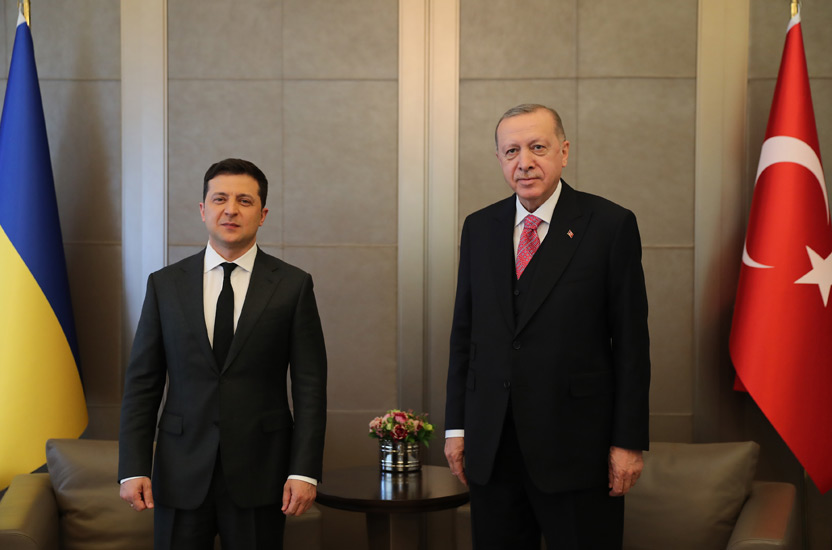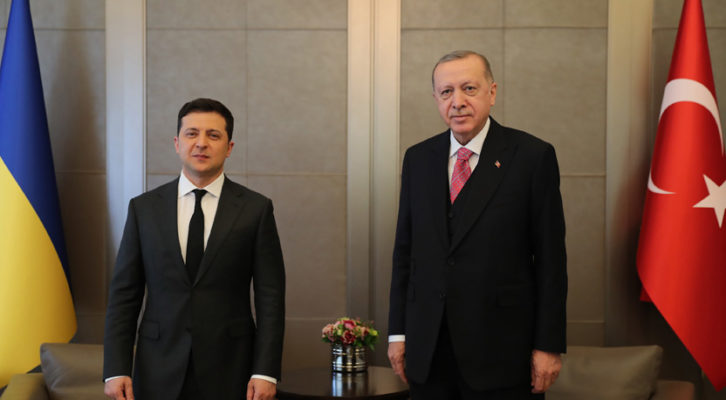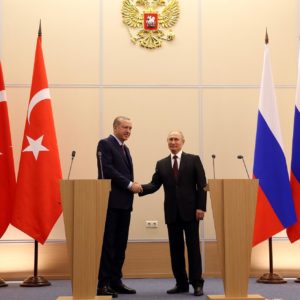
President Recep Tayyip Erdoğan and President Volodymyr Zelensky of Ukraine at Huber Villa in Istanbul (Photo: Presidency of the Republic of Turkey, April 10, 2021)
Introduction
In the past few years, Turkey has been gradually increasing its influence in Ukraine through trade and military cooperation amid escalating tensions between Moscow and Kyiv, challenging Moscow’s standing in the Black Sea region. The strategic cooperation between Ankara and Kyiv is not limited to political statements, but rather encompasses other important fields, such as the economy, security and defense industries. Moreover, relations between the two countries gained further impetus with Russia’s unification of Crimea in 2014 and reached their peak during the administration of Ukrainian President Volodymyr Zelensky, who assumed office in 2019.
On the 10th anniversary of Ukraine’s strategic partnership with Turkey, President Zelensky visited Istanbul to meet with President Recep Tayyip Erdogan. Both leaders took part in the ninth meeting of the Turkish-Ukrainian High-Level Strategic Cooperation Council. The primary purpose of this visit was to ask for Turkey’s support against Russia, a more pressing priority than trade and investment.
It is clear that the context of the meeting and Erdogan’s position on the annexation of Crimea, which he labeled “illegal and illegitimate,” added more fuel to the confrontation with Russia. However, in this analysis, I will argue that despite the Turkish-Ukrainian military cooperation and Ankara’s fear of turning the Black Sea into a “Russian lake,” it is unlikely that Turkey will go further and support Ukraine militarily in the case of a full-scale war with Russia, though it will maintain its political and technical assistance to Kyiv in order to counterbalance Russia in the Black Sea region.
Hence, there is no indication that Turkey, unlike in Libya, Syria and Nagorno-Karabakh/Artsakh, is preparing for direct intervention in case of a military escalation in eastern Ukraine. Ankara is in no position to tip the balance of power in Kyiv’s favor. Such a move would lead a financially unstable Turkey to face harsh consequences. On April 12, 2021, after the meeting between the Turkish and Ukrainian leaders, the Russian government announced it was halting regular and charter flights to Turkey until June 1 because of COVID-19 worries. This decision, reminiscent of the pressure campaign Moscow carried out during the “jet crisis” of 2015-2016, might have been driven by genuine pandemic-related concerns, but it also sent a clear message.
For Ukraine, it is important to achieve Turkey’s political support in its conflict with Russia. Turkey has continuously supported Ukraine’s territorial integrity and sovereignty, as well as its NATO aspirations, calling for its membership in NATO. Turkey also has sent a delegation to Ukraine’s Crimea Platform summit as a signal of solidarity and has become one of Ukraine’s top foreign investors.
Nevertheless, Turkey’s back-and-forth with Ukraine tells us something important about its strategy vis-à-vis Russia; that is, Ankara ensures co-opetition with Moscow does not get out of control. President Erdogan is aware that a showdown with the Russians over the Donbas or Crimea carries heavy costs and few, if any, gains. Against these odds, Turkey’s best option is “soft balancing”—simultaneously cooperating with Russia in the post-Soviet space, hiding behind NATO’s deterrence shield and building security ties with Azerbaijan, Georgia or Ukraine.
Containing Russia in the Black Sea by arming Ukraine
Turkey views Ukraine as a crucial buffer against Russia. After the 2014 military developments in Ukraine, Russia increased the size of its naval fleet. Despite his antagonism against the West, Erdogan has advocated for a stronger NATO presence in the Black Sea region. More recently, Turkey has looked at the Black Sea as a step toward greater energy independence. In October 2020, Ankara announced the discovery of 405 billion cubic meters of gas off its Black Sea coast, the largest finding in the country’s history. Turkey perceives Russia’s military expansion in the Black Sea area as a threat to its geopolitical and energy security.
For Erdogan, Russia’s military buildup marked a turning point. Before the Ukrainian conflict in 2014, Turkey was a preeminent naval power in the Black Sea, with 44 surface ships compared to Russia’s 26. This has changed after Crimea’s unification with Russia which radically changed the naval balance of power. By 2019, Russia had eclipsed Turkey, boasting 49 surface ships. Moscow has also installed offensive weapons like ballistic Kalibr and Iskander missiles capable of carrying nuclear warheads and an S-400 missile system.
After years of making it difficult for NATO to operate in the Black Sea, Erdogan, realizing he was being isolated, began supporting a greater NATO role in the region. At a conference of Balkan Chiefs of Defense in June, Erdogan told NATO’s Secretary-General, “You are not visible in the Black Sea, and your invisibility in the Black Sea turns it into a Russian lake.” He continued, “As NATO members, we should take all required steps in all spheres, including the sea, air and ground. Otherwise, history shall not forgive us.”
Unsurprisingly, Turkey’s concerns in the Black Sea region pushed to deepen its military ties with Ukraine. Turkish and Ukrainian companies are currently working on more than 30 projects. During his visit to Kyiv in February 2021, Erdogan signed off on $36 million in military aid to the Ukrainian army in its fight against the pro-Russian forces in the east—another boost to bilateral defense cooperation.
However, the most significant issue about this deepening military partnership with Ukraine is Turkey’s eagerness to resolve its shortcomings in engine production for its well-known domestically-produced Bayraktar TB2 combat drones. Ukraine produces engines for Turkey’s armed Bayraktar drones, which have tipped the balance of power in favor of Turkey’s allies in Libya and Nagorno-Karabakh. Ukrainian engines allow Turkey to export its own military products without the worry of securing export licenses that it can no longer obtain from the United States, since being slapped with sanctions under the Countering America’s Adversaries Through Sanctions Act over Ankara’s acquisition of the Russian S-400 missile system.
But it is Ukraine’s purchase of Turkey’s combat drones, which military experts and analysts are watching closely, especially as tensions in eastern Ukraine heat up. Turkey’s Baykar Defense and Ukraine’s Ukrspecexport established a joint venture company named Black Sea Shield to domestically produce as many as 48 Bayraktar TB2 combat drones and to develop engine technologies and guided munitions. Ukrainian military experts have closely studied the use of the drone in the Nagorno-Karabakh war. For military experts, the chance of replicating the successful combination of Turkish drones and military expertise that led to victory in Nagorno-Karabakh is surely tempting to risk-takers in Kyiv and Ankara.
Both Turkish and Ukrainian analysts argue that the deployment of Bayraktar combat drones would be a game-changer in a future potential conflict between Ukraine and Russia. Bilgehan Ozturk, an analyst with the Ankara-based think tank SETA Foundation, has told Al Jazeera that Turkey is aware that “Russian capacity is not enough in the face of Turkish UAVs.” Hence, the Bayraktars would give the upper hand to Ukrainian forces in a future conflict between Ukraine and Russia. Meanwhile, Mikhail Samus, deputy director of the Kyiv-based think tank Center for Army Research, Conversion and Disarmament, reasons that Putin’s call for the Russian military to make greater use of artificial intelligence “and the latest scientific and technological advances” to enhance Russia’s drone arsenal suggests that Putin senses the need for a UAV that “could compete with the (drones of the) Ukrainian armed forces.” Interestingly, the Ukrainian expert reveals that now Ukraine already has more Bayraktars than Azerbaijan. Russia is worried about this because Azerbaijan was able to completely change warfare in the fall of 2020.
Another Russian concern, according to the Samus, is that the Ukrainian Navy will start receiving systems that will not only conduct reconnaissance for the Neptune anti-ship cruise missiles indicating their targets but will also have strike capabilities themselves. The P-360 Neptune is the Ukrainian cruise anti-ship missile system adopted by the Ukrainian Defense Ministry in August 2020. Of course, the Neptune system will play the main part, but it needs its targets to be determined. Without the drones, the Neptune will be blind. So the role of drones, including the Bayraktars, is crucial here, as Turkish drones are capable of monitoring the situation 24/7, keeping track of traffic at sea.
More recently, the Turkish Defense Ministry announced that the Ukrainian Naval Forces Command personnel were given “navy internship” training on a Turkish corvette. The announcement coincided with Russia expressing increasing discomfort with Turkish-Ukrainian military cooperation following a Turkish-made drone attack against Russian-backed forces in eastern Ukraine. Among the areas of cooperation is the exchange of intelligence. The military intelligence clause of the agreement covers the exchange of military intelligence about “countries that are considered to be harmful to the mutual interests of Turkey and Ukraine.”
Undoubtedly, Turkey’s active involvement in Ukraine’s defense industry has raised eyebrows in Russia. In an interview with the Argumenty i Fakty newspaper, Russian Foreign Minister Sergey Lavrov said, “We strongly recommend that our Turkish colleagues carefully analyze the situation and stop fueling Kyiv’s militaristic sentiment.” Lavrov also added, “We hope Ankara will adjust its line based on our legitimate concerns.”
How would Turkey react in the event of a new escalation between Russia and Ukraine?
Erdogan recognizes that both the Turkish economy and its popularity are in decline. He knows that normalizing relations with Western allies and boosting Turkey’s pro-Western credentials are the only ways to create a positive economic outlook and ease Turkey’s international isolation. Erdogan knows that by gambling in Ukraine in favor of NATO, he can remind his NATO allies that Turkey is a valuable asset in southeastern Europe to contain Russia.
Turkey’s position is pivotal as the main sea line of communication for the Russian navy goes through the Turkish Straits. Some analysts argue that in a worst-case scenario, if firmly supported by NATO, Turkey could revoke the 1936 Montreux Convention, which guarantees free passage for Russian ships through the Turkish Straits. For this reason, Turkey may like to see a greater NATO presence in the Black Sea, however, the 1936 Montreux Convention governing the free passage through the Bosphorus Strait requires Ankara to limit the volume, tonnage and length of stay of all vessels belonging to non-littoral Black Sea states. This is an uncomfortable position for Turkey, as it is legally obliged to limit NATO’s naval access to the Black Sea. Nevertheless, the Convention suits Moscow and explains Putin’s insistence on preserving it, despite Turkey pondering on withdrawing its signature. If Turkey closes the Bosphorus in front of the Russian navy with NATO’s support, no matter the Montreux Convention, it will prevent Russia from sending its fleets to the Eastern Mediterranean.
Nevertheless, this is a very risky task and will receive a strong reaction from Russia. Turkey is not ready to risk its arrangements with Russia in the region to please its NATO allies. For this reason, Erdogan is eager to finalize the construction of the Istanbul Canal, which will run parallel to the Bosphorus between the Black Sea and the Sea of Marmara. The canal is one of Erdogan’s “mega-projects,” and it should boost the Turkish leader’s prestige and allow his country to make a leap in its economic development. But the ambiguity of the application of international legal regulations to this new sea route and, consequently, the inviolability of the Montreux Convention cannot but cause Russia concern.
According to Dimitar Bechev, visiting scholar at Carnegie Europe, Turkey cannot extend the same support to Ukraine it has given to Azerbaijan. It is worth mentioning that Turkey tasted Putin’s wrath when it downed a Russian jet over Syria in 2015. The Russian leader slapped trade sanctions on Turkey and stopped Russian tourists from traveling to the country. Erdogan would not repeat a similar mistake as his country is facing a currency and debt crisis. Hence, directly gambling in Ukraine is a risky venture for Turkey. The best illustration was in 2014, when Turkey not only denounced the annexation of Crimea but then refused to join Western sanctions. The bottom line: Turkey can help by selling military hardware to Kyiv, providing assistance to Crimean Tatars and support for NATO’s enlargement in the Black Sea and Eastern Europe.
On October 23, Ukrainian state television broadcast a video showing its Bayraktar drone used against Russian-backed forces in the eastern Donbas region. To prevent any tension with Russia, Turkey quickly reacted. After meeting with Lavrov at the G20 Summit in Rome, Foreign Minister Mevlut Cavusoglu claimed that Turkey takes no responsibility for the usage of the drones it sells. On October 27, Putin spokesman Dmitry Peskov warned that deliveries of these drones to Ukrainian forces “can destabilize the situation in Donbas,” while Russia’s United Nations Ambassador Vasily Nebenzia denounced Ukraine’s October use of the Bayraktar as a “dangerous game.”
Conclusion and Assessment
Over the past two decades, Russia has consolidated its presence in the Black Sea region by directly controlling Georgia’s Abkhazia and South Ossetia in 2008 and Ukraine’s Crimea in 2014. The Black Sea Fleet is responsible for bringing supplies to Russian forces in Syria, mostly based in the port of Tartus and Khmeimim airbase, as well as for patrolling the eastern Mediterranean. Russia’s 2015 Maritime Doctrine clearly prioritizes the Black Sea as a pillar of its power projection.
The 2014 unification of Crimea with Russia tipped the balance of military power in the Black Sea in favor of Moscow. Not only did Russia cancel existing agreements with Ukraine which limited its Black Sea fleet in Sevastopol, but it stationed new military ships and submarines and installed a dense network of advanced weapons systems across the Crimean peninsula. It has also significantly increased its Exclusive Economic Zone and its Black Sea coastline. This has raised concerns in Turkey. Like a chessboard, Turkey feels surrounded from the north (Crimea), east (Armenia) and south (Syria) with Russian military presence.
Turkey feels it is in the crosshairs of Russian regional ambitions. Turkey and Russia are not allies, but bitter frenemies. They support opposing sides from the South Caucasus to the Middle East. Despite having robust commercial, energy, diplomatic and military ties, Turkey’s president warned back in 2016 that NATO has to act and increase its presence in the Black Sea. For this reason, Erdogan initiated the construction of the Istanbul Canal to put additional pressure on Russia regarding the 1936 Montreux Convention.
The Turkish-Ukrainian military cooperation flourishes at the cost of this uneasy relationship with Russia, which contains a number of contradictions on several issues across different geopolitical areas. While a war between Russia and Ukraine is not on the horizon, despite the ear-splitting voices and reports coming from Western intelligence reports and their media, it is still important to mention that any possible conflict in Ukraine will have a dangerous impact on the South Caucasus and the fragile ceasefire situation in Artsakh and the Armenian-Azerbaijani border. Russia is concerned about a two-front war in the Black Sea and South Caucasus. Such a scenario would be disastrous for Armenia and the Armenians of Artsakh. Azerbaijan (backed by Turkey) would seek to accomplish the unfinished task, to ethnically cleanse the Armenians of Artsakh. Amid mounting pressures from its western and southern border, Russia, if cornered, may compromise temporarily in the South Caucasus to preserve its imminent strategic interests in Ukraine and the Black Sea.
The article was originally published in the Armenian Weekly, 15/12/2021.
Yeghia Tashjian is a regional analyst and researcher. He has graduated from the American University of Beirut in Public Policy and International Affairs. He pursued his BA at Haigazian University in political science in 2013. In 2010, he founded the New Eastern Politics forum/blog. He was a research assistant at the Armenian Diaspora Research Center at Haigazian University. Currently, he is the regional officer of Women in War, a gender-based think tank. He has participated in international conferences in Frankfurt, Vienna, Uppsala, New Delhi and Yerevan. He has presented various topics from minority rights to regional security issues. His thesis topic was on China’s geopolitical and energy security interests in Iran and the Persian Gulf. He is a contributor to various local and regional newspapers and a presenter of the “Turkey Today” program for Radio Voice of Van. Recently he has been appointed as associate fellow at the Issam Fares Institute for Public Policy and International Affairs at the American University of Beirut and Middle East-South Caucasus expert in the European Geopolitical Forum.







